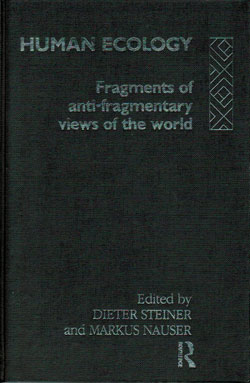Herausgegeben von Dieter Steiner und Markus Nauser
365 p., Routledge, London 1993.
Dieser Sammelband ist das Resultat der von der Gruppe für Humanökologie des Geographischen Institutes der ETH Zürich organisierten internationalen Tagung "Person - Society - Environment", die vom 24. bis zum 26. Mai 1989 in Appenberg BE stattfand.
Das Buch wird heute von Routledge (Francis & Taylor) für £ 125 angeboten. Gebrauchte Exemplare finden sich bei Amazon von € 30 an aufwärts. Es ist auch als eBook erhältlich.
"Klappentext" :
We face an environmental catastrophe of global proportions. The ecological rationality of modern society, and of science in particular, is in question. Science still responds to crises at the level of technocratic expertise, and still treats society as an adaptive system. By bringing together a number of integrative approaches to the human-environment problem, Human Ecology shapes a more radical, fundamental agenda for change. The book creates a framework for a cohesive discourse, for a "new human ecology". From the notion that the individual person is an agent mediating between society and environment, the individual contributors recognize that the environmental crisis is really a crisis of society - manifesting itself in an increasing fragmentation of lives in general and knowledge in particular. Arguing for environmentally sustainable lifestyles, the book envisages a new kind of consciousness and a new environment.
Im folgenden wird das Inhaltsverzeichnis wiedergegeben.
Human Ecology and Biohistory
Conceptual approaches to understanding human situations in the biosphere
by Stephen Boyden
1 Introduction
2 The Current Human Situation in Biohistorical Perspective
3 The Application and Advantages of Biohistory
4 The Limitations of Biohistory
5 The Fundamental Questions Program
Part I: Integrative ecological and biosocial assessment of the human situation in Australia
Part II: Consideration of the societal implications of the ecoiogical and biosocial assessment
Part III: Reintegration, synthesis and practical policies
6 Conclusion
